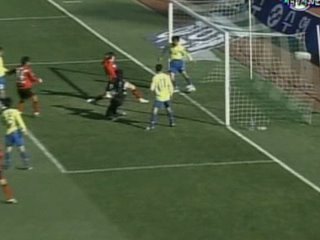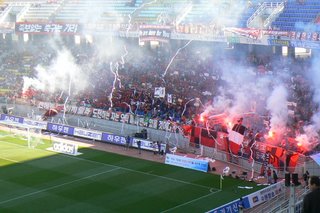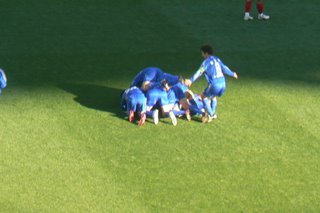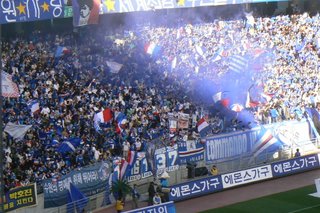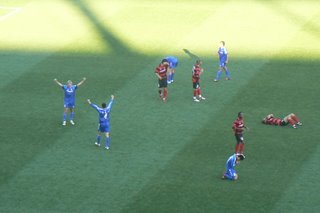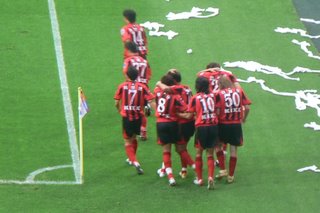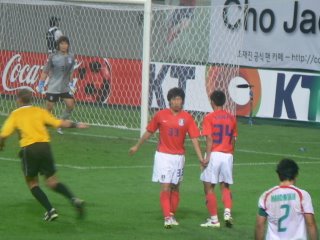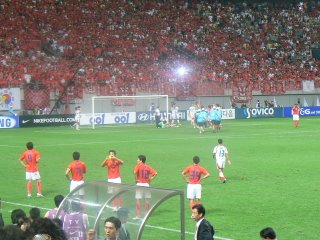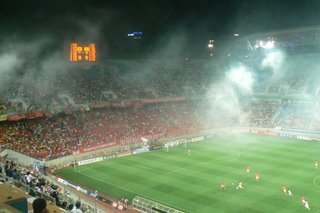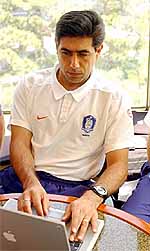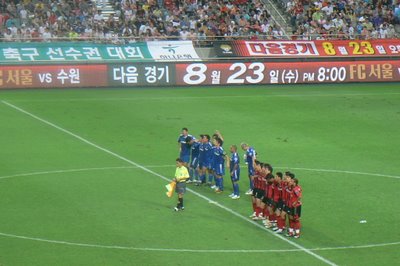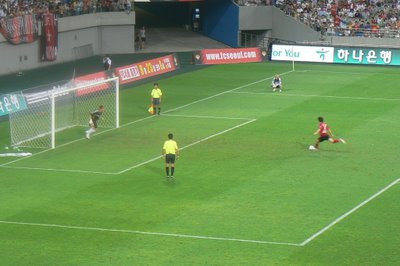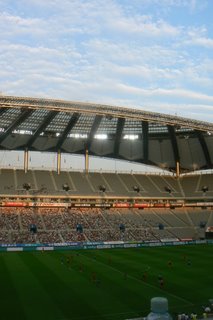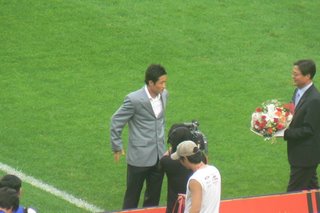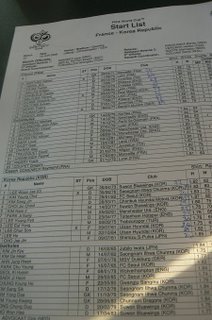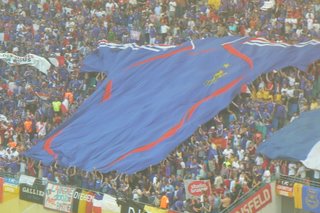When were you offered the job? We started talking seriously around the World Cup, before the game against Togo. At the time, we had the first meetings because officially Advocaat told the KFA on 15th June that he was leaving. I think that was three or four days after the Togo game. Before that he had a meeting with the KFA and told them that he would definitely leave the Korean national team.
That is when they came to me and said “he is leaving and we would like to go on with you.”
What was your reaction?To be honest, my plan was to go to Europe. I had been away from my family for so long and I had more or less decided to go back to Europe and spend at least five or six months there and see what is happening.
Then this came and my family knows very well how much I like it in Korea and what I think about Korean football so they could understand that this was an offer I could not refuse. This is perhaps the only foreign job I would take because I know the country so well. I really think we can have great success.
It’s an obvious question but what are the main differences between being the assistant and head coach of South Korea?
Working with Hiddink and Advocaat is not so difficult because they give you all the freedom to organize the training sessions, to prepare team meetings and analysis and things like that. In the end, they take the final decision. You can have so many ideas yourself but in the end you always have to go to somebody who makes the final decision.
The good part is that with Hiddink and Advocaat, I never had a problem with the line-up, selection or whatever. You do a lot of the work but you never had the responsibility, that’s the biggest difference. If we win, I am responsible. If we lose, I am also responsible but that’s just a feeling.
How about the day-to-day things, the social side? You know I always refuse interviews because of the limited time we have and also because I wanted to first have some results, know the players better and people know me better before I start talking about what the plans are.
The second part is that it is not so easy to go outside any more. Is that a big problem? For me it’s quite a big problem to be honest. I’d like to be outside and see something of the Korean culture and be among the people -drink a cup of coffee and visit a nice place. It is not so nice any more to go out and if I go out I wear a hat and sunglasses and that works but… it’s good that I have already seen a lot of Korea as now I spend my spare time inside.
The price you pay… Yes, I knew that. I saw it with Hiddink and Advocaat. I always thought that that is the least interesting part of the job. I understand that everyone wants pictures and autographs and I try to co-operate as much as possible but it keeps you more inside and away from the social side than I like.
Has that aspect changed a lot since you became head coach? It’s very strange. I was already here nine months and people recognize you and they say hello and take pictures but the moment they knew I was the new head coach, it was like I had scored ten goals in the World Cup!
It’s very strange but it keeps my feet on the ground because it has nothing to do with me but it’s all about my position. As the national team coach I am on television more than I was before. It’s not because I am a nice guy or because of my blue eyes but because I am the national team coach.
You are popular in Korea but after a few bad results, that could change. Are you prepared for that? That’s the responsibility you take. I have the idea that the coaching staff and me do everything to make the team better and the players better and to win games. So as long as I have the feeling myself that I have done everything I can then I will accept everything. I have no problems at all with that. I started my coaching career in 1987 so after 19 years, nothing surprises me.
I didn’t come here to be the most popular and nice guy in Korea, I am here to get results from the national team and build up the national team.
The situation is different than the last two times you were here. Then, everything was focused on the World Cup but now there is a real chance to start from scratch. Yes, it’s very different. We have a short-term plan and a long-term plan. I have tried to mix both but it depends a little bit on the results. It would have made my plans a lot easier if we had already qualified for the Asian Cup because then we could look toward the Asian Games, the Asian Cup and the Olympics but still now we need to get a point from the last two qualifying games.
It’s not easy to go to Iran and you know in football that everything is possible. People say “it’s only Syria at home” but in football everything is possible. We have to concentrate and bring in the best team we can find. This is no time for taking risks because that is what I’ve heard from left and right that some people still think that I don’t take enough risks.
I am not here to take risks. I am here to bring in the best players or bring in those who have a future and bring them in at the right moment like I did last week with Choi Sung-kuk. He had a very good training camp and is doing very well at Ulsan.
Who are these people who say you don’t take enough risks? There are always people around in every job who think they know better than you – what you should and shouldn’t do. I don’t care about that as I think that is a strong point of football also. Everybody has an opinion; everybody speaks about it and is blaming players, coaches or referees. I am not stressed about it.
In answer to your question though I am trying to qualify for the Asian Cup and give young players a chance to show what they can do and also give the young players a chance to train with the best players we have in Korea. For every young player to train and play with people like Seol Ki-hyeon, Lee Young-pyo and Park Ji-sung is great and not only in training as they hear so many stories about how it is in Europe and how you can get there.
What is the main difference between you and Advocaat?Advocaat was here for the World Cup and everything was geared towards that. He didn't have time to think about the long-term development of the game and the players but wanted good results – that was his job – though he did help young players like Lee Ho, Kim Dong-jin and Cho Won-hee.
He always wanted good results, even in friendlies because it not only helped confidence but because he knew that in Korea, results mean everything. I think that sometimes it is more important to give young players a chance in a friendly but Advocaat’s job was the World Cup. I have more time.
In the friendly games I will use some players and let them get some experience because that is the only way that they will become better players. It is also possible to make mistakes. I think that people in Korea have some problems to accept that, they think that if you are a national team player then you cannot make mistakes.
Last Saturday (in the 1-1 draw with Iran in which Iran scored in the last-minute to earn a 1-1 draw) we brought in one of the youngest and most talented young goalkeepers that we have in Korea (Kim Young-kwang). He played two very good games for us and we had no complaints at all. He did very well in training and he’s involved in one goal. I think there are three other players involved in that situation who made the first three mistakes. But people ask ‘why didn’t he play Woon-jae?”
In that situation where a mistake leads to a goal, what do you say to the players after a game? After the game I didn’t say anything because I know from my experience that there is too much emotion. If you win there is a lot of emotion but it’s different but last week the level of disappointment was so high for everybody.
Nobody expected that we would concede a goal – nobody, because they had no chances at all. I told the players that I would say what I wanted to say on the next day. First you have to let the emotion slide away and then the next day they are more open to what I have to say.
So what did you say? Of course, it was all to do with concentration, like it was in the World Cup. Without blaming Choi Jin-cheul but we knew exactly how Switzerland take the free-kicks and the corner kicks. When they take a free-kick and their most important player scores a goal then it has to do without concentration.
At that moment we were chasing the game and the consequences of losing concentration and playing for themselves are serious. Nam-il said that to the media, I never knew it but he said it anyway and I think everybody agreed with it and even the players agree. We showed them video analysis and we showed them what we didn’t do well. It’s nothing to do with the result but if you want to be a better team we need to avoid things like that.
So you agree with what Kim Nam-il said? (the new captain criticized overseas players such as Seol Ki-hyeon and Park Ji-sung for not playing for the team) I fully agree. The players agree also with me. I can understand because I have been in Korea a long time already. The moment some players get the ball, the fans go crazy so the players always want to show how good they are and they want to entertain. I told them “do that when it is 6-0” and even then I think you should still play for the team.
We gave examples when everybody was there, I know it’s not really Korean style to confront players with what they did wrong but they know me well enough to know that we have to learn from our mistakes.
I’m not hiding. I think that everybody can make mistakes but you have to be alert and aware enough to know that you have made a mistake and the next time you should not make a mistake. If you make the same mistake three times and then you’re out.
The European-based players are used to getting criticised by the coach. I think I was fair; I showed them and didn’t say anything stupid after the game by yelling or shouting. That’s useless.
What about the World Cup? What were your thoughts on the team’s performance in 2006? We still think and everybody thinks that the players could have done better. That’s easy to say but afterwards you need to find out what the problems are. For me it was easy because we had too short preparation time – that’s one.
Secondly, the players who are the most important players in your team at that moment, all of them came unfit – through an injury or not playing games for their clubs for the last four, five or six months.
For example Ahn Jung-hwan, Seol Ki-hyeon, Park Ji-sung –he came with an injury, he missed the first three weeks and he is a key player for us. So, the pressure and responsibility fell on the shoulders of players who are not the kind of players who can take it.
We knew that because of the lack of preparation that the players would get better as they played more games and we were 100% sure that it we reached the second round then the players would get much, much better – Park Ji-sung was much better in the final game than he was in the first or second game. He hadn’t played for four weeks. That was bad for him, the pressure on his shoulders was so big, he’s playing in Europe and everybody expects so much. You know how many commercials they made over here.
That was one of the most important reasons why we didn’t go to the second round. The first game we were under a lot of pressure, everybody expects us to win against Togo but it’s the first game for a lot of players in the World Cup. In the second game against France, we did much better and against Switzerland it’s all or nothing.
We gave an unnecessary goal away then you know you have to score a minimum of two.
What about the second Switzerland goal? I still think it’s offside but I’ve seen so many times in football than a goal is 100% offside for one referee and the next referee doesn’t even look at it. I think that nobody knows what the exact rules are.
Many in Korea felt that the tactics and formations were too defensive, especially against Togo when Korea were leading 2-1 and against ten men and Switzerland, what would you say to that? I don’t agree – at all. The only thing that matters in the first game is winning -three points. It was the same situation last week against Iran. We are winning 1-0 and the three points are very important. You can do two things and say ‘OK, we are going for 2-0 and then the game is finished but if that is not possible you say ‘OK, take the three points’.
I still think that Togo was dangerous in the counter-attack so why make it stupid for yourself and allow them a chance to make it 2-2? Three points is most important. Even with the next game against France, we always knew from the start that the Swiss game would be the most decisive game.
It’s easy to say three games afterwards that we should have scored more goals –if, if, if. Afterwards, I also know exactly what went well and what went wrong. I have no problems if people think that way but only one person makes the decision.
It’s been an interesting couple of weeks for some of Korea’s players. For example, you omitted Ahn Jung-hwan from the Iran squad as he is currently without a club. What advice would you give to him to get back in the national team?He knows also that he was gambling. He must have been gambling, I am not involved and I am not his agent but I am 100% sure that there were some teams interested in him and probably they were not at the level he had in mind to play at for the rest of his career.
That’s gambling – he took a risk to wait for a better possibility. Everybody is responsible for his own decisions and I think this is the wrong decision. I am sure that he thinks the same. Even if he doesn’t play in the biggest league in the world he is still playing football and he is still at an age where he can play for another two or three years. Put yourself in one of those leagues and if you score 20 goals in one of those so-called ‘minor leagues’ then you are still an interesting player.
What are the chances of him playing for the national team again? At this moment –absolutely zero. There is no chance. I really like him as a player because he is a player that can decide any game. I was really thinking about using him in the Iran game because even in the last 15-20 minutes, he can do a job and score a goal.
It is impossible. I can’t defend my decision to the outside world to take a player without a club who hasn’t played a game for two months. Secondly, I knew that Jung Jo-gook was playing well in Seoul and if you leave out a talented player like Park Chu-young saying that he’s not playing so well then how can you select a player without a club?
I can still think about his qualities but you can’t take a player who is not playing and has no future.
If he joins a team, it doesn’t matter so much what kind of team and what kind of league, as long as he’s playing football? Yes, for me it doesn’t make a difference. There are no players in Korea at the moment with his qualities. Jo-gook is a good player for the future but we don’t have players like Ahn who can decide the game out of nothing. He is an experienced player and really wants to play in the Asian Cup.
Why do you think he has such problems with his club career? If I am the coach of a club then I would look at his resume and to be honest, he didn’t have so many appearances in France and then he went to Germany and played twice in five months. He is 30 years old and coaches start thinking that maybe he isn’t one of the cheapest players and then they think he’s too risky.
I still think that for a lot of teams that he can be an interesting player. If any coach calls me I will tell him Ahn’s qualities.
I would also say that he was not lucky in Germany. He arrived at a bad time. The moment he arrived in Duisberg, the team started winning without him. For a new player, that’s a disaster, it’s good for the club but not for the player. I understand the coach, he’s winning without Ahn so why change?
He was unlucky because I spoke with the director and the coach before they bought him. I explained to them exactly what kind of player he is and they said that desperately needed a type like that – they were so positive and so enthusiastic so they took him but then they started winning without him, then it’s difficult.
For us he was a starting member but he didn’t show in the three weeks before the World Cup that he was fit enough, mentally fit enough and that he was sharp enough to start in the World Cup.
It was the same with Seol Ki-hyeon. I think nobody in England could foresee that Seol is playing as well as he is doing now. If you look at his time with Wolves, especially the last six months, he was never in the team. Could you have told anybody that a player who couldn’t play in a second division team in England is now one of the most attractive players in the Premiership?
How about Lee Chun-soo? He had a chance of a trial in England but he turned it down.I didn’t know that until last week. I haven’t spoken to him about it but I can understand as he wants to go abroad.
Would he do well in England? I think Chun-soo can play in any game, anywhere in Europe because he has many special qualities though he still has a lot to learn. A lot of coaches and teams would be very happy to have a player like that who is left and right footed, he can score goals and he can score free-kicks. He’s willing to work for 90 minutes. A fit Lee Chun-soo is for any team, except perhaps the top three in the big leagues, a good player.
Many Dutch teams would be very happy to have a player like him. The only problem is that we don’t have the money to have a player like Lee Chun-soo. That’s a pity because I still think that the Dutch league is for any player, especially from Asia, to show themselves and get used to the European level, is a good league.
Also there was Lee Young-pyo and his near move to Roma, what was your take on that?I saw him play for Spurs recently in the right-full back position. I saw that the left full-back they bought from Lens in France was doing a very good job. I think that Young-pyo also knows that the left-sided position will not be easy for him.
I don’t know. I spoke to him and said “if you your future is at Spurs then you have to focus on the right full-back position because I think the left back is doing a good job.”
I have no idea why he didn’t go to Roma. He told me that it had nothing to do with his religion. But what the real reason was, he said ‘I will keep it to myself.”
Spurs bought a new right-back, a very promising, talented, right full-back ..
And expensive… And expensive and I know the coach is really happy with his new signings but I also know that he was really willing to keep Young-pyo. I don’t see many players who can play left-back and right-back and have such a fantastic mentality.
How about Park Chu-young, do you think too much pressure was placed on his shoulders too quickly? Yes – we knew that last year. Even last year we had our doubts but every ball he touched was a goal – he had the golden touch. Everybody knows also that after such a year it will be difficult – not only now but it already started in March.
From March to the World Cup he didn’t do well but we took him because he still had something special – he’s fast, he’s hard-working and he can score goals. We had our doubts before the World Cup?
What kind of doubts?He wasn’t playing well; he didn’t score goals any more. He started not to play for the team but to go for his own chances which if you are feeling well is good but if you are not feeling well then you have to look a little bit more for your team-mates.
It was difficult for a 20 year-old player to continue at the same level. It’s not bad at this time for him to be out of the squad line-up and return to do what he’s always done, scoring goals for his club and getting his confidence back.
I’ve always said that we can use him for the next few years because he is one of our promising players. The question is how long he will stay in the deep hole that he is in at the moment. He knows – he’s intelligent. That’s the good part, he’s not acting as a star – at all. He just hangs around with the other players, working hard in training. The difference is that last year that everything he touched was a goal but this year it is going over and wide and to the goalkeeper.
One problem is that he is not a player for a three-striker system. He’s a two-striker system player where he has a free role and can run everywhere and be dangerous in front of the penalty area. So we have to change our system and use his qualities or he has to change.
Also Lee Eul-young has retired from the national team…He said to me in the training camp that “there are so many good players – it is time for them now, they are good enough and getting better all the time, I want to focus on my own club.”
I told him that I respected what he said. I still think that technical-wise that he is one of our better players; he never makes a mistake when he has the ball. I said to him: “stay with us this week and let the young players learn from you.” He said no problem.
I respect his decision and I think he is right. The younger generation is growing very fast. He had a great career, he played in two World Cups and he played in Europe. He was a technical and very intelligent player.
Will the team miss him? He is not a starting member any more because the younger players are coming. Everyone knows about the qualities of Baek Ji-hoon, Jung-woo, Lee Ho so they all have to fight and Doo-heon is showing himself. We have some 16 or 17 year-old players in FC Seoul, we have Oh Beom-seok who can play in several positions so it would have been difficult for Eul-yong to be a starting member but I always like that kind of player to help the younger ones. Especially in training, players like Ji-hoon can learn a lot from him.
What are your plans for the rest of the year apart from qualifying from the Asian Cup? We're focusing on the Asian games. We have to make a quick decision about the Asian Games selection.
Are the Asian Games a big deal? I think so. If you look at the possible selection then there are a lot of national team players, the more international experience they get, the better it is. A lot of these players will be in line to play in the Asian Cup and if you look at their age then they in 2010 they will be around 27 and the main part of the national team. Even if it isn’t the highest quality tournament, you still have to play international games and I like to have the team together.
But first we must qualify for the Asian Cup.
K.League NewsTagsK-League soccer football Pim Verbeek Korea Park Chu young Lee Young-pyo Lee Chun-sooCopyright © John Duerden & Soccerphile.com
Read an interview with Pim's younger brother Robert Verbeek, presently coach of J-League Omiya Ardija for the 2007 Season.
Robert Verbeek InterviewCanon Word Tank V30
